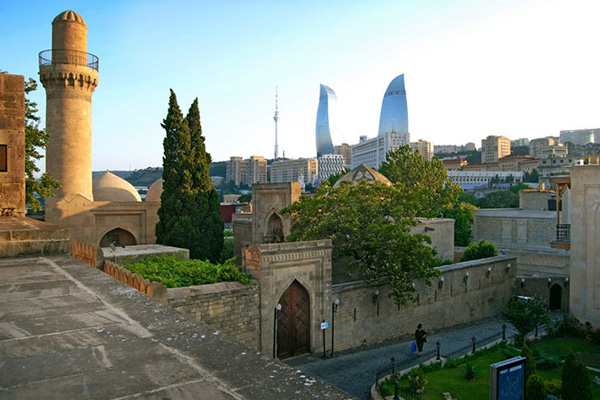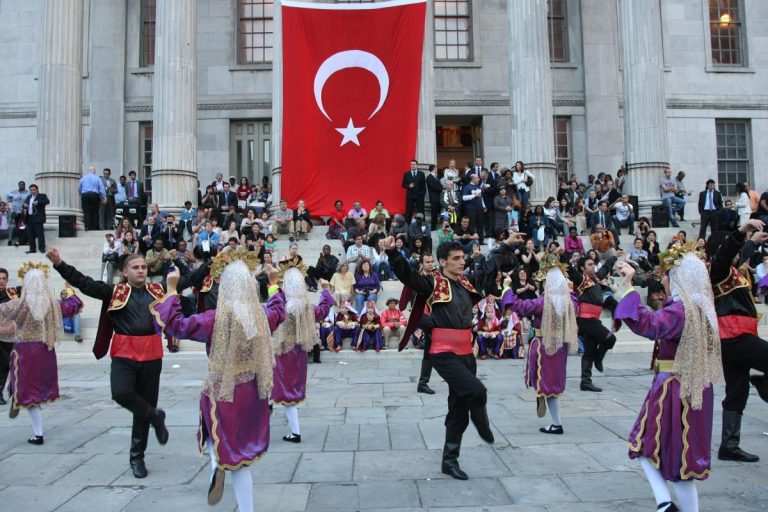Baku, also known as the “City of Winds”, is the vibrant capital city of Azerbaijan. Located on the western coast of the Caspian Sea, Baku has a rich history and culture that dates back to ancient times. It is the largest city in the Caucasus region, and serves as the commercial, cultural, and political hub of Azerbaijan.
In recent years, Baku has undergone rapid development and modernization, making it a popular tourist destination. Its unique blend of old and new, along with its strategic location, makes it a fascinating city to explore. In this blog post, we will dive into the history, culture, attractions, and economic significance of Baku as the capital of Azerbaijan.
History of Baku: The Capital of Azerbaijan

Baku has a long and eventful history, with evidence of human settlement dating back to the Stone Age. Throughout the centuries, it has been ruled by various empires, including the Persian, Roman, Arabic, Mongol, and Russian empires. In May 1918, Baku became the capital of the newly independent Azerbaijan Democratic Republic, and has remained the capital ever since.
During the Soviet era, Baku experienced significant industrial growth, becoming an important oil-producing city. However, it also faced challenges, including political turmoil and environmental issues. After gaining independence in 1991, Baku has once again become a thriving city, with the government investing in infrastructure and tourism.
Culture and Heritage of Baku

Baku is a melting pot of cultures, with influences from Persia, Russia, Turkey, and the Middle East. This can be seen in its architecture, cuisine, and customs. The Old City, also known as Icherisheher, is a UNESCO World Heritage Site and one of the main cultural hubs of Baku.
Within the walls of the Old City, visitors can find ancient mosques, palaces, and traditional markets. It is a perfect place to immerse oneself in the rich history and heritage of Baku. One of the most iconic landmarks of the Old City is the Maiden Tower, a mysterious cylindrical structure that dates back to the 12th century.
Baku is also known for its music and dance traditions. The city hosts several music and dance festivals, showcasing both traditional and contemporary performances. The National Museum of Azerbaijan History and the Museum of Modern Art are also must-visit destinations for those interested in learning more about the culture and heritage of Baku.
Baku: A Vibrant Metropolis

In recent years, Baku has undergone rapid development, transforming from a Soviet-style city to a modern metropolis. The city skyline is now adorned with glittering skyscrapers, including the iconic Flame Towers, which have become a symbol of Baku’s modernization.
One of the best ways to experience Baku is by taking a walk along the Seaside Boulevard. This promenade offers stunning views of the Caspian Sea, along with various entertainment options such as parks, cafes, and an amusement park. In the evening, the promenade comes alive with colorful lights and street performers, making it a popular spot for both locals and tourists.
Baku is also home to numerous shopping centers, restaurants, and luxury hotels, catering to all types of travelers. The city has a vibrant nightlife, with clubs and bars offering a mix of local and international music. It is a city that never sleeps, and there is always something to do or see.
Must-Visit Attractions in Baku

Apart from the Old City and the promenade, there are plenty of other attractions in Baku that are worth visiting. These include:
Heydar Aliyev Center
The Heydar Aliyev Center is a futuristic building designed by renowned architect Zaha Hadid. It serves as a museum, conference center, and cultural venue, hosting various exhibitions and events throughout the year.
Palace of the Shirvanshahs
Built in the 15th century, this palace complex is another UNESCO World Heritage Site. It was the seat of power for the ruling dynasty of Shirvanshahs and is an excellent example of medieval Islamic architecture.
Yanar Dag (Burning Mountain)
Located on the outskirts of Baku, Yanar Dag is a natural phenomenon where flames continuously burn from vents in the ground. It is believed to be caused by underground gas deposits, and the sight of the never-ending fire is truly mesmerizing.
Gobustan National Park
A short drive from Baku will take you to Gobustan National Park, home to ancient rock carvings and mud volcanoes. This park offers a glimpse into Azerbaijan’s prehistoric past and its geological wonders.
Baku’s Role in the Caspian Sea Region
Baku’s strategic location on the Caspian Sea has made it a significant port city and a gateway to the Caucasus region. The city has played a crucial role in the region’s trade and commerce, connecting Europe and Asia through the Silk Road.
With the discovery of oil in the late 19th century, Baku became one of the world’s leading oil producers, earning it the nickname “Black Gold City”. Today, it continues to be a vital hub for the oil and gas industry, with the Baku-Tbilisi-Ceyhan pipeline transporting oil from the Caspian Sea to the Mediterranean.
Apart from the energy sector, Baku also plays a significant role in the region’s transportation and logistics industry, with the Heydar Aliyev International Airport serving as a major air transport hub. Baku’s strategic location and economic stability have also made it an attractive destination for foreign investment, leading to its growth as a regional business and financial center.
Economic Significance of Baku as Azerbaijan’s Capital
As the capital city of Azerbaijan, Baku is the country’s economic hub. It accounts for over 50% of Azerbaijan’s GDP and is home to numerous companies and businesses in various industries, including oil and gas, banking, tourism, and construction.
The government has also invested heavily in infrastructure development, including transport networks, housing, and public facilities, to support Baku’s economic growth. The city is continuously expanding, with new residential areas and commercial developments being built to accommodate its growing population and economy.
Baku has also become a popular destination for international conferences and events, further boosting its economy and promoting its role as a regional leader. In 2019, Baku hosted the 18th Non-Aligned Movement Summit, which brought together leaders from over 120 countries to discuss global issues.
Modern Architecture and Skyline of Baku
One of the most striking features of Baku is its modern architecture and skyline. Along with the Flame Towers and Heydar Aliyev Center, the city boasts other impressive structures such as the Azerbaijan Tower, which is set to be the tallest building in the world upon completion.
Apart from these architectural marvels, Baku’s skyline is also dotted with sleek high-rise buildings and skyscrapers, housing offices, hotels, and apartments. The city’s blend of old and new, along with its innovative designs, has made it an increasingly popular filming location for movies and TV shows.
Baku: A Gateway to the Caucasus Region
Apart from its economic significance, Baku’s strategic location also makes it a gateway to the Caucasus region. With easy access to neighboring countries such as Georgia, Iran, and Russia, Baku serves as a hub for travelers looking to explore the diverse cultures and landscapes of the Caucasus.
The government has also implemented visa-free policies for citizens of several countries, making it easier for tourists to visit Baku and other parts of Azerbaijan. Baku’s modern infrastructure, luxurious accommodation options, and range of activities make it an ideal base for travelers looking to discover the beauty of the Caucasus.
Future Prospects of Baku as Azerbaijan’s Capital
Baku’s future looks bright, with the government continuing to invest in various sectors and attract international attention. The city is set to host more international events, including matches for the UEFA European Football Championship in 2021, further putting it on the map as a top sporting destination.
The government has also launched the “Baku White City” project, which aims to transform the former industrial area into a modern district with residential, commercial, and entertainment facilities. This project is a testament to Baku’s commitment to sustainable development and its vision for the future.
Conclusion
In conclusion, Baku is a city that has been shaped by its past and is continuously evolving towards its future. Its rich history, culture, and modern developments make it a unique and fascinating destination for travelers. As the capital of Azerbaijan and a crucial player in the Caspian Sea region, Baku will undoubtedly continue to thrive and attract visitors from all over the world. Whether you are interested in history, culture, or modern amenities, Baku has something to offer everyone. So, be sure to add this vibrant metropolis to your travel bucket list!
Also visit for more blogs at : Michael Clements of Windward Capital



